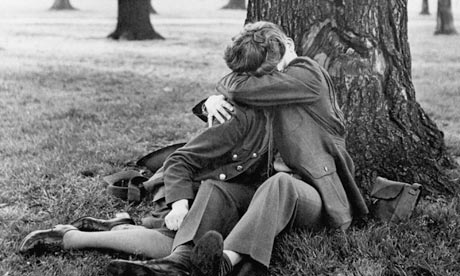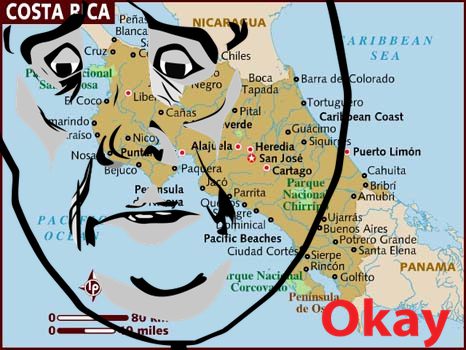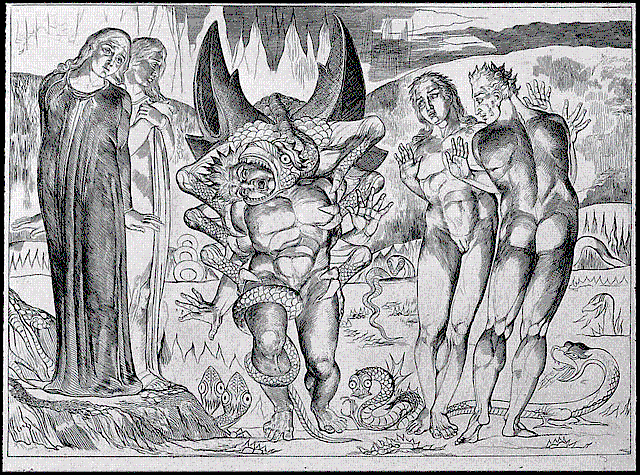The absence of people we love isn’t absence at all. For absence is just that — nothingness, a lack, the not-being-there of a particular person. If this is what we felt in the gone-awayness of our loved ones, than the phenomenon of missing them would not exist. Would we experience their absence as just that — absence, nothing at all, experienced as I currently experience the absence of Costa Rica, as simply not there for me.
The absence of the loved one isn’t absence at all, but the concentration of their presence. This is one of those marvelous ways in which the human person transcends the apparent laws of space and time, noting them only long enough to say, “No, thank you, I’d rather things be incredible.” We feel the missing person like an atmosphere, not gone so much as everywhere, the whole world crowded as a Parisian metro with their nearness. As if the hole spoke of its doughnut, as if silence sounded like the missing lover’s voice, so nothingness takes the shape of the absent person, and thus cannot be called nothingness. But it gets worse. We’ve heard the cliche — you don’t know what you have until it’s gone — and it is rooted in experiential truth, for not only do we feel the presence of the person in their absence, but we often feel it even more acutely than in their simple presence.
 Absence reveals to us the core of who we love. There are hundreds of different ways to relate to our loved ones. There is the relation of space, by which we are near to them, them to us, and our relationship can be measured with a straight line. There is the relation of time, measured by the hours, days, and years we are with the beloved. There is the physical relationship, by which we relate to each other in our bodies, each of us, through touch, momentarily occupying the same space, as well as the relationship of all our other senses — we hear, smell, see, and in the deeper intimacies of mother and child, lover and lover, even taste the loved one.
Absence reveals to us the core of who we love. There are hundreds of different ways to relate to our loved ones. There is the relation of space, by which we are near to them, them to us, and our relationship can be measured with a straight line. There is the relation of time, measured by the hours, days, and years we are with the beloved. There is the physical relationship, by which we relate to each other in our bodies, each of us, through touch, momentarily occupying the same space, as well as the relationship of all our other senses — we hear, smell, see, and in the deeper intimacies of mother and child, lover and lover, even taste the loved one.
But the very fact of a wonderful, multitudinous splay of possible modes of relation suggests that there is some core relation that makes them possible. We assume this in our relationships of love. We can keenly feel when a relationship that enables all others is being neglected for a particular mode of relation. “You just love because you’ve known me for so long,” we say, and thereby fault the other for holding the particular mode of temporal relation over some primary relation. “You just love me for my body,” pointing out that the physical-sensual mode of relation is being placed above a relationship which ought to establish it.
This will be very difficult to slip through the skulls of a scientistic age, but I believe personal relationship renders all other modes happily possible. Difficult, because we — and by we I mean others — think of the material as all that is real. The concept of the person — a synthesis of body and soul — is a concept that assumes there is such a thing as the spiritual. Surely this is religious nonsense? Surely it is the physical that serves as the basic relationship that makes all other modes of relating possible? Surely the actual, observable, scientific fact of an existing human enables all subsequent relating?
No — boring, awful, wrong. The physical only exists because it is an expression of the entire person. We move, touch, smell, speak and gesture, but we do so as revelation of the spiritual. We reach out and touch the face of our loved one, but this physical reaching only exists because it is prompted by our internal desire and our free decision. Our body expresses our internal life. When a girl holds our hand, we are overjoyed, not just because we are delighting in the physical fact of a hand wrapping around our own, but because we know that the knowable hand-hold is a revelation of an unknowable, unobservable decision within the girl to hold our hand. In short, we know that the physical relationship is only possible because of the existence of a person, the existence of a secret, interior spiritual life which expresses itself through the physical. Hand-holding is not an action of the hand, but an action of the person. If there is physical relation, it is only because there is first a person, a hypostasis, that synthesis of body and soul.
Lust is evil precisely because it is moronic in this regard. It takes the physical and treats it as if it were not the revelation of an internal life, as if kisses were simply the gift of a pair of lips and not the gift of a particular person, emanating from his unobservable interior life. Purely physical relation, that is, relation to a body that does not presuppose an internal life expressed by that body, is relation to a corpse, which has all the happiness of being precisely what materialists say we are — all material.
But enough meandering. When the loved one is ripped from our universe, whether in death, loss or heartbreak, we do not experience their absence as nothingness, as their simply not-being-there. Rather, we experience the absence of all modes of relation as painfully revelatory of the one relationship upon which they are founded — the personal relationship, which may be accessed through the physical, the sensual, the temporal, the spacial, and all the rest, but ultimately transcends each of these modes by fathering-forth the very possibility of their existence. Absence strips relation to its core. All we have left, when the loved one is absent, is the very person of the loved one, terribly inaccessible, but painfully present nonetheless, in what Christos Yannaras calls the non-dimensional space of personal relation.

Christians, is this not how we relate to God and to his Saints? Is there any absence more present? Are we not flung hard against His person by the fact that He is not available to our immediate modes of relation? “Because you have seen me, you have believed; blessed are those who have not seen and yet have believed.” (John 20:29) The Christian’s blessedness is precisely his personal relationship with God; thank God then, for an absence that delivers so mighty a personal presence. This is one the reasons I find arguments with the new atheist difficult — the absence that is his trump card is my reason for belief. But it is love that makes the difference.
(There is much more to be said here. For instance, we may experience the absence of a loved animal or country as painful presence. How, if they are not persons? In short, because we who miss our hometowns are persons, and by our love we incorporate them into personal relation, something only possible if all things are in fact the revelations of a personal God. But I need to think about it. (Possible next post: When You Love a Mountain You Contribute to the Creation of a New Earth, Maybe.))













